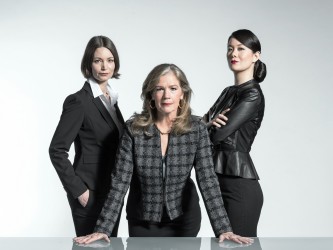Complex Comedy Offers Much to Ponder
The Seattle Rep commissioned this World Premiere and workshopped it in a couple of other cities before tonight’s opening. Four of the five people critical to the production—writer Laura Shellhardt, director Braden Abraham, Cheyenne Casebier (Monica) and Linda Gehringer (Bette)—have been involved through the long process of development. The third member of the cast, Keiko Green (Iris) is new to the production. This show has focus and sparkle because the cast has mutual trust and the writing and direction have cut out all dross. The opening night was sold out.
The initial questions for this play were discussions that Schellhardt (The K of D) and Abraham (Who’s Afraid of Virginia Woolf) were having when newly minted women CEO’s Marissa Mayer at Yahoo and Sheryl Sandberg at Facebook were much discussed in the news. According to the Rep’s press release, these events raised three main questions, to whit:
What does it take to be a high-ranking woman in the business world? Linda Gehringer’s Bette character rebounded from discrimination she endured earlier in her career to build a real estate dynasty called “The Boutique.” At her entry level job she was hazed, made fun of, and lied to by men. Now that she has worked her way to the top, she hires predominately women, but there’s a gender discrimination suit pending from a male job applicant who was not hired, he claims, due to his gender. Gehringer specializes in creating roles in premiere shows, and her performance here sets a standard that will be hard to surpass in future productions. She’s tough, she’s conniving, she’s shows both “tough love” and indifference to her employees. She has a lot, but wants more. Bu if there is more, then is she really at the top?
Monica (Casebier) provides the “load-bearing pillar” of support that allows Bette to excel in the outside world. She writes Bette’s speeches and witty catch phrases such as the one projected on the office walls: “Location is Destiny.” For ten years she’s been steadily promoted with new job titles and cake. She’s hoping to take over the office as Bette concentrates on her upcoming reality TV show. This character must walk the tautest and highest moral highwires, and Casebier does so with aplomb. Shifts of posture and bearing communicate as much as the words she uses what her mental or emotional states are. At one point, Bette comments that Monica even has the “smell of success” on her, and one fancies a faint whiff of it 10 rows back in the audience.
Green plays the character Iris with brio. She’s the new hire and instantly shakes up the habitual routines that Bette and Monica have fallen into. She nudges Monica to demand that promotion she deserves. That this would provide an opening for Iris’s own promotion is not a side benefit, it is her goal. What happens in the business world is a stack of games that Iris plays to win by her own rules when it’s expedient.
Is their success defined by a different set of criteria than men? The play circles and circles around this question. The answer depends on who defines the success. For Mayer and Sandberg, they were hired by boards that were doubtlessly overwhelmingly male. These executives still hold their positions, so they must be achieving an adequate level of success according to the people who hired them. Turns out, within the fishbowl world of “The Boutique” with a woman boss and all woman staff, they just accept that success goes to the person that grabs the brass ring first. So it looked like any other success: sell the most expensive homes for the most money and get promoted. Failure is not an option.
How are women helping or hindering themselves and each other in their rise to the top? This question describes the whole plot of the play. The short answer is that women both help and hinder, as most people do when thrust into competitive structures where winners take the most and the rules are never discussed much less agreed upon.
Shellhardt has crafted a funny Everywoman’s morality play. She has a terrific ear for metaphors and similes. These gems were all over the place: Bette’s teenage sparring partner at the Aikido dojo is “just a six floor walk up without air conditioning.” Dealing with gender discrimination is like “being in a fight with invisible fists.” Abraham directs with pitch and pace, characters are speaking over each other at times and that adds to the illusion we are witness to a something really happening. It would help that some of the recorded audio memo be were broadcast at higher volumes.
The Scenic Design by Carey Wong conveyed a modern chrome and glass mixed cubicle/office design. Furniture contributions from Herman Miller and Microsoft lent legitimacy to the set. Costumes by Frances Kenny conveyed so much about the characters and their feelings before they said a word.
The Comparables by Laura Schellhardt, directed by Braden Abraham. World Premiere. Seattle Repertory Theatre at Seattle Center. Run time 85 minutes without intermission. March 6 – 29, 7:30 PM evening shows and 2 PM matinees. Tickets at 206-443-2222 or seattlerep.org Closes March 29.




















